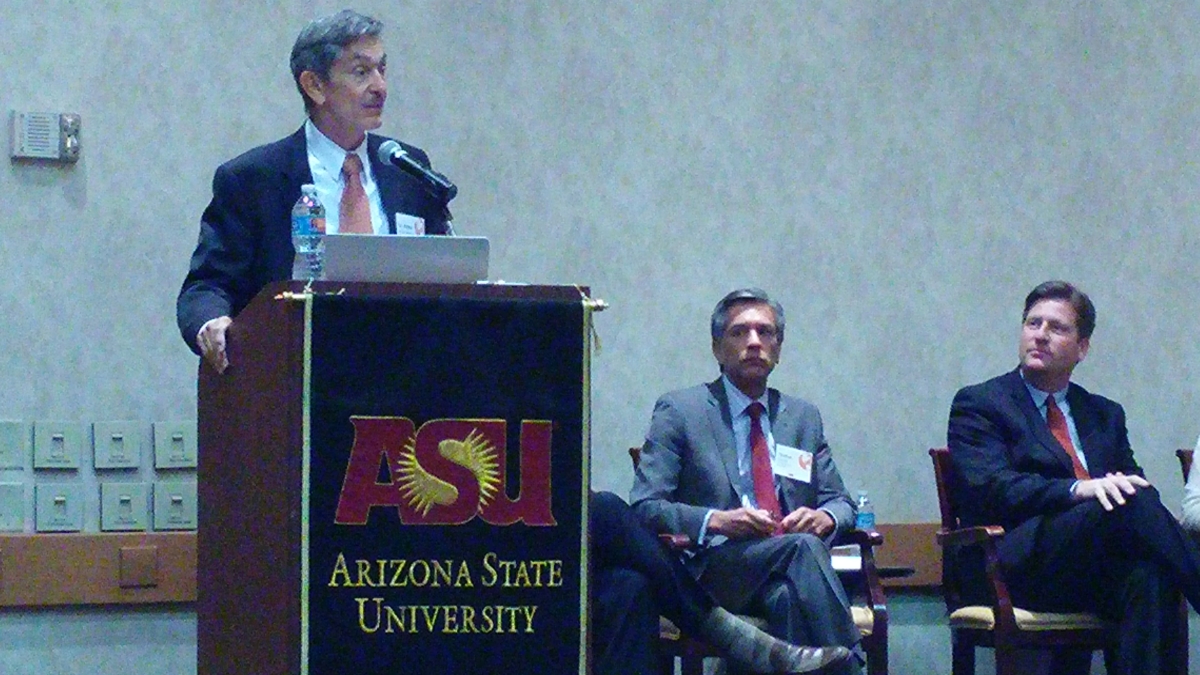ASU unites Mexican, Canadian stakeholders for new economic cooperation

The leader of the sixth-largest city in the nation did not mince words Wednesday when he stressed the economic importance of America’s neighbors during an Arizona State University-organized conference in Phoenix.
Phoenix Mayor Greg Stanton kicked off ASU’s first North American Economic Connectivity Conference, which brought together more than 200 industry leaders, government officials and educators to Phoenix for a one-day event consisting of expert panel discussions meant to stimulate ideas and build new ties for future business collaboration.
“We cannot begin to talk about the U.S. economy, especially our local economy, the Phoenix economy without taking into account our North American partners in Mexico and Canada,” he said. “We simply cannot build a wall or slap on a tariff and magically see 4 percent gross domestic product growth. It’s not going to happen.”
The mayor revealed his city’s progress with Mexico, including the upcoming opening of a ProMexico office in Phoenix. ProMexico offices, nestled under Mexico’s economy secretariat, promote international trade and investment. Mayor Stanton also revealed that although U.S. exports are on the decline, Arizona exporting is up 12 percent overall and up 22 percent to Mexico.
“ASU picked a great time for this conference, especially as far as Phoenix is concerned,” he added.
Thomas Guevara, deputy assistant secretary for regional affairs in the Economic Development Administration for the U.S. Department of Commerce, also provided opening remarks and emphasized the importance of higher learning institutions in inciting this type of collaboration.
“Universities, for example, are key partners in creating the conditions for growth,” said Guevara. “They are social-network centers, knowledge creators and most importantly institutions of openness and diversity that parse the new ideas and enable us to solve the difficult problems. This is why this gathering supported by ASU is so important.”
ASU leaders understand the “tremendous” continued economic development opportunities in the Mexico and Canada zones, said Sethuraman “Panch” Panchanathan, senior vice president of ASU's Office of Knowledge Enterprise Development. He said the university already is partnering with its neighbors on many fronts, including energy sectors, aerospace and biomedical devices.
“We are committed as a university to make sure we’re doing our part in terms of contributing to the economic development of this trilateral relationship,” said Panchanathan. “We at ASU view ourselves as a knowledge enterprise — a knowledge enterprise which produces people, ideas and things.”
Panchanathan also said that the university’s work is being noticed and mentioned a recent accolade bestowed by the U.S. News and World report rankings.
“Just a week and a half ago ASU was named most innovative university in the U.S.,” he said. “The second university was Stanford. The third university was MIT. So we’re number one.”
Through four panel discussion held throughout the day, experts from all three countries provided a glimpse of ongoing economic efforts, tactics, opportunities and challenges. The first panel looked at the use of cluster mapping as a way to identify transborder opportunities. Subsequent panels focused on initiatives to catalyze economic development, border business experiences from current industry leaders and specific opportunities in the Arizona and Sonora, Mexico, region.
One of the leading Mexican universities, and an ASU partner, conducting research to pinpoint areas for economic development is the Instituto Tecnológico y de Estudios Superiores de Monterrey. Pablo de la Peña is the director of strategic programs and executive education for its School of Government and Public Transformation, and served as one of the presenters during the conference. He has been on the forefront on identifying “zones of opportunity” through cluster mapping of industries.
“The space and medical-equipment sectors are growing greatly in Mexico,” he said. “The idea is to have a regional area of binational development so we can identify business opportunities for both of these sectors, for both of these countries.”
Executive-level conference participants included Ana Luisa Fajer-Flores, director general for North America in the Mexico Ministry of Foreign Affairs; and Glenn Williamson, honorary consul for Canada for Arizona and founder and CEO of the Canada Arizona Business Council.
Conference attendees included local mayors, city council members, business leaders, state officials and higher-education institutions’ representatives. Mexico’s delegation included business executives, private-sector organizations, higher-education institutions’ leaders and students, and government officials.
More Business and entrepreneurship

With help from ASU and a viral TikTok, an entrepreneur soars
Nearly five years ago, Ruben Trujillo saw his entrepreneurial dream slipping away as he wondered how he would pay his rent.Now, Trujillo’s business, Café Emporos, is featured on a national TV…

Honoring 2 decades of entrepreneurial impact on a global scale
Thunderbird for Good, the impact-driven initiative of Thunderbird School of Global Management at Arizona State University, is marking two decades of educational programs and initiatives dedicated to…

ASU and GoDaddy launch Student Athlete Venture Studio
In a groundbreaking initiative aimed at empowering college athletes beyond their playing careers, Arizona State University and GoDaddy teamed up to launch the first-of-its-kind Student Athlete…

